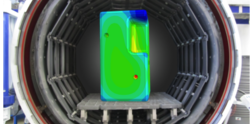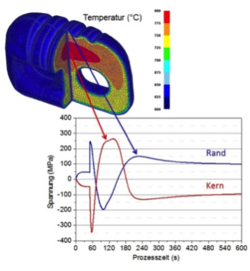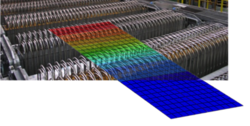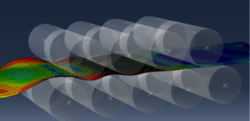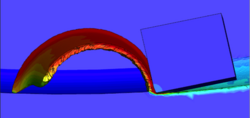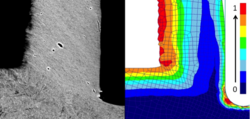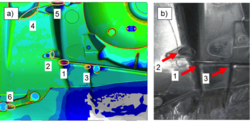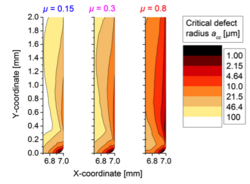Process and Process Chain Simulation
Materials and their properties are not only defined by their chemical composition; rather, the manufacturing process determines much of what they are – and what they are capable of. Therefore, an in-depth understanding of the manufacturing process and of its influence on the material properties is essential.
This understanding, leading to strategies for optimized materials and material properties, may be significantly supported and promoted by numerical simulation. Research at MCL does not only concentrate on the manufactured products, but also on the tools used in the production process, as most innovations on the sectors of materials and processes are only possible with the appropriate tools available.
Research in process and process chain simulation at MCL covers the following areas:
Simulation of Heat Treatment Processes
A special focus of research in production processes at MCL is on the simulation of heat treatment of steels. In the course of that process, a number of physical phenomena (e.g., heat transfer, heat conduction, viscoplasticity, phase transformations, transformation-induced plasticity) occur simultaneously, each one interacting with each other. These complex mechanisms and their influences on the local material properties and residual stresses – which will finally be inhomogeneously distributed across the workpiece – are described by strongly nonlinear, coupled constitutive laws and can hardly be understood and controlled without the aid of numerical simulation. For the numerical simulation of heat treatment processes, MCL pursues an approach strongly focused on the basic principles of physics of materials, but still oriented towards materials engineering applications; accordingly, many material models and constitutive laws advancing the state of the art have been developed and implemented.
From all heat treatment processes, inductive heat treatment poses special challenges for simulation, process design and control due to the additional electro-magnetic coupling. For this reason, MCL is currently focusing on such simulations, aiming at model-based process control for robust attainment of the desired target properties.
Besides conventional heat treatment aggregates, also a novel induction heat treatment test rig is available at MCL for validation and transfer of research results to industrial processes.
Prediction of Material Properties and Residual Stress Design
Process chain simulation is a rapidly growing field of research. On one hand, the allowed tolerance bands for the properties of semi-finished and final products are becoming continually narrower, thereby demanding increased accuracy of the respective prediction models; on the other hand increasing computational capacities and improved simulation methods allow to include the complete chain of production processes – if necessary from primary shaping to surface finishing – into the models for predicting the final properties.
For enabling an end-to-end process chain simulation for property prediction, one needs detailed knowledge and simulation models for each individual manufacturing process as well as appropriate interfaces between the individual simulations. Some examples for process chains investigated at MCL are
- casting and heat treatment of aluminium components,
- rolling, accelerated cooling and straightening of steel sheets,
- forming, inductive hardening and tempering of steel bars,
- forging and direct aging of nickel-base superalloys.
For implementing such process models in model based plant control systems, the computing time must be reduced from many hours, as it is typical for finite element simulations, to seconds or milliseconds for real-time applications. To this purpose, MCL has been developing effective methods for model reduction in the course of previous and current research projects.
Simulation of Machining Processes
Machining is one of the major factors affecting costs and quality of components. With the classical machining processes turning and milling, extreme local deformations and heating occur in the process zone. These are demanding conditions for the tool and have significant effects on the quality of the workpiece surface with respect to roughness and near-surface residual stresses. MCL is conducting research in the field of machining simulation with focus on
- machinability of materials,
- influence of the machining process on fatigue and rolling contact fatigue lifetime,
- dynamics of the system workpiece – cutting insert – machine tool,
- ideal design of cutting inserts with respect to base material, coating and geometry.
Tool Lifetime
Innovative tool technology has always been a basic prerequisite for new production and materials technologies. Tools are subjected to extreme mechanical, thermal and tribological loads. For this reason, tool materials – mostly high speed tool steels, hard metals and ceramics – can be considered as the cream of the crop with respect to strength and temperature resistance.
A major challenge in the simulation of tool loading and lifetime are the multi-physics (thermal-mechanical-tribological) nature of the process, where the tribological and heat transfer conditions at the interface between tool and workpiece are most difficult to assess. For obtaining the tool loading, it is therefore indispensable to model the complete machining process. High local pressure loads on the tool lead to local plastic deformation, tensile residual stresses and an overall reduction of tool lifetime. Due to the high stress gradient near the surface, the lifetime typically depends on fatigue crack propagation rather than crack initiation. For this reason, fracture mechanics plays an important role in residual lifetime assessment of tools.
Publications
Prediction of Material Properties & Residual Stress Design
- A. Drexler, H. Maderbacher, E. Povoden-Karadeniz, H.-P. Gänser, W. Ecker, B. Oberwinkler, A. Fischersworring-Bunk, Yield stress evolution in Inconel 718 samples under standard heat treatment process conditions of turbine disks, in: Proceedings of the European Conference on Heat Treatment 2015 & 22nd IFHTSE Congress 2015
- A.Drexler, H.-P.Gänser, W.Ecker, B. Oberwinkler, A.Fischersworring-Bunk: Computationally efficient models for the forced air cooling of turbine disks. In: Proceedings of the 5th International Conference on Thermal Process Modeling and Computer Simulation: Orlando, Florida USA, June 16-18, 2014. Gaylord Palms Resort & Convention Center: ASM, (2014) 223-231
- W. Essl, T. Antretter, E. Parteder, An Efficient Algorithm for Modeling the Thermo-Mechanical Material Response of Heavy Steel Plates during Accelerated Cooling, Key Engineering Materials, Vols. 554-557, (2013) 749-763
- T. Kaltenbrunner, T. Antretter, W. Ecker, R. Kaiser, H.-P. Gänser, E. Parteder, Local yield strength distribution in heavy steel plates after straightening In: Proceedings of the 10th International Rolling Conference and the 7th European Rolling Conference, Graz Austria, June 6-9, 2016
Heat Treatment Simulation
- M. Schemmel, P. Prevedel, R. Schöngrundner, W. Ecker, T. Antretter, Size effects in residual stress formation during quenching of cylinders made of hot-work tool steel, Advances in Materials Science and Engineering (2015) 678056
- S. Eck, P. Prevedel, S. Marsoner, W. Ecker, M. Illmeier, Finite element simulation of stress evolution during quenching in the case of quenched and tempered tyre protection chains, In: Proceedings of the European Conference on Heat Treatment and the 21st IFHTSE Congress, May 12th-15th, 2014, Munich, Germany, 335-345
- M. Schemmel, P. Prevedel, R. Schöngrundner, W. Ecker, T. Antretter, Modelling of phase transformations and residual stress formation in hot-work tool steel components, , In: Proceedings of the European Conference on Heat Treatment and the 21st IFHTSE Congress, May 12th-15th, 2014, Munich, Germany, 285-292
- S. Eck, P. Prevedel, S. Marsoner, W. Ecker, M. Illmeier, Using finite element simulation to optimise the heat treatment of tyre protection chains, Journal of Materials Engineering and Performance 23 (2014) 1288-1295
Simulation of Machining Processes
- I. Krajinović, W. Daves, M. Tkadletz, T. Teppernegg, T. Klünsner, N. Schalk, C. Mitterer, C. Tritremmel, W. Ecker, C. Czettl, Finite element study of the influence of hard coatings on hard metal tool loading during milling. Surface and Coatings Technology, 304, (2016)134-141
- S. Eck, H.-P. Gänser, S. Marsoner, W. Ecker, Error analysis for finite element simulation of orthogonal cutting and its validation via quick stop experiments, Machining Science and Technology: An International Journal (2015)
Tool lifetime
- W. Ecker, T. Klünsner, P. Raninger, M. Krobath, S. Marsoner and R. Ebner, Methodology for Advanced Tool Load Analysis, BHM, (2014)
- R. Ebner, W. Ecker, S. Marsoner, S. Eck, P. Gruber, P. Raninger, M. Krobath, Methodology for advanced tool load analysis and lifetime prediction of tools, In: H. Leitner, R. Kranz, A. Tremmel (Eds.): Developing the World of Tooling. Proceedings of the 9th International Tooling Conference. Leoben, (2012) 2-21
- R. Ebner, P. Gruber, W. Ecker, O. Kolednik, M. Krobath, G. Jesner, Fatigue damage mechanisms and evolution near cyclically loaded edges, Bulletin of the Polish Academy of Science: Technical Sciences, Vol. 58, No. 2, (2010)
- R. Ebner, S. Marsoner, I. Siller, W. Ecker, Thermal fatigue behaviour of hot work tool steels - heat check nucleation and growth, International Journal of Microstructure and Materials Properties, (2008) 182 -194
- P. Raninger, W. Ecker, T. Antretter, M. Leindl, and R. Ebner. Interaction of heat checks in aluminum pressure casting dies and their effect on fatigue life. Key Engineering Materials, 488-489: (2012) 626–629
- R. Schöngrundner, W. Ecker, S. Marsoner, R. Ebner, Development of a Simulation Aided Design Strategy for Casting Die Frames, In: H. Leitner, R. Kranz, A. Tremmel (Eds.): Developing the World of Tooling. Proceedings of the 9th International Tooling Conference. Leoben, (2012), 523-532



















